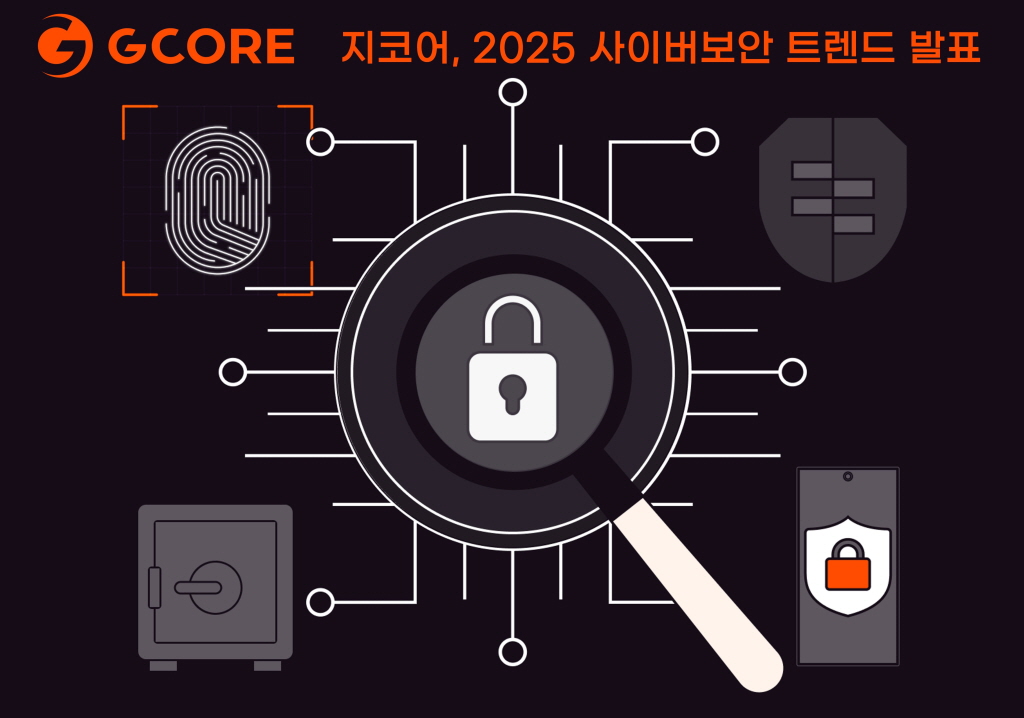글로벌 엣지 AI, 클라우드, 네트워크, 보안 솔루션 전문 기업 지코어가 진화하는 사이버 위협에 대응하고, 고객의 민감한 정보는 보호하면서 원활한 사용자 경험을 제공하기 위해 기업이 참고해야 할 2025 사이버보안 트렌드를 발표했다.
AI 기반 보안성 높이고, 사용자 편의성 제약하지 않아야
“지능형 사이버공격자들에 대응하기 위해서는 AI로 강화된 보안 솔루션을 갖춰 위협 탐지 및 대응 민첩성을 갖춰야 한다”
글로벌 엣지 AI, 클라우드, 네트워크, 보안 솔루션 전문 기업 지코어가 14일 진화하는 사이버 위협에 대응하고, 고객의 민감한 정보는 보호하면서 원활한 사용자 경험을 제공하기 위해 기업이 참고해야 할 2025 사이버보안 트렌드를 발표했다.
지코어는 CDN과 클라우드 서비스를 기반으로 전 세계 6개 대륙에 180개 이상의 PoP(point of presence)를 보유하고 있다. 이러한 광범위한 글로벌 네트워크를 통해 탐지된 디도스(DDoS) 공격 동향을 분석해 반기마다 ‘지코어 레이더 보고서’를 공개하고 있다. 이번 2025 사이버보안 트렌드도 수년간 누적된 데이터의 분석과 사이버 위협의 특징 변화를 토대로 구성됐다.
지코어가 주목한 2025을 좌우할 사이버보안 트렌드는 다음의 10가지다.
△제로데이 취약점의 증가 △공격자의 무기가 된 AI △사이버보안의 근간이 되는 AI △데이터 프라이버시의 복잡성 증가 △사용자 인증 과제 △공급망 보안의 중요성 증가 △보안과 사용자 경험의 균형 △클라우드 서비스 보안과 잘못된 환경 구성 △내부자 공격의 위협 △엣지 컴퓨팅의 증가와 대비 등이다.
지코어는 제로데이 취약점을 노리고, AI를 통해 정교한 공격을 감행하는 지능형 사이버공격자들에 대응하기 위해서는 AI로 강화된 보안 솔루션을 갖춰 위협 탐지 및 대응 민첩성을 갖춰야 한다고 조언했다.
예를 들어 AI로 생성된 피싱 캠페인은 고급 자연어 처리를 사용해 사이버 공격의 성공 가능성을 높이고, 딥페이크 기술은 공격자가 금융 사기나 평판 손상을 위해 그럴듯한 오디오 및 비디오로 경영진이나 직원을 사칭할 수 있게 함으로써 복잡성을 더하게 된다.
또한 데이터 개인정보 보호규정이 사이버보안 전략에 통합됨에 따라 데이터 암호화와 관련된 엄격한 가이드라인을 시행할 준비가 되어야 한다고 설명했다. 이미 일부 기업에서는 사용자가 자신의 데이터를 잘 제어할 수 있도록 블록체인과 같은 탈중앙화된 보안 모델을 고려하고 있다. 이러한 보안 전략이 제로트러스트 접근 방식과 결합되면 개인정보 보호와 보안을 모두 강화하는데 도움이 될 수 있다고 지코어는 덧붙였다.
사이버보안에 있어서 결국 사용자의 신원인증 역시 복잡성을 더해가고 있지만 AI기반 솔루션을 토대로 사용자처럼 행동하는 봇을 식별하고, 시스템이 사용자의 행동이나 기록, 전체적인 맥락을 실시간으로 분석해 정상적인 사용자를 방해하는 것을 최소화할 수 있도록 지원해야 한다.
뿐만 아니라 2025년에는 사이버공격자가 타사 공급업체의 취약점을 이용해 대규모 네트워크에 침투하는 공급망 보안 침해도 증가할 것으로 전망되는 가운데 기업은 공급망을 조사하고 모니터링할 수 있는 AI 기반의 솔루션에 투자해야 한다.
거의 모든 기업이 적어도 한 곳 이상의 공급망 밴더와 연결되어 있기 때문에 이 중 어느 한 곳이 공격을 받으면 공급망 산업 전반에 걸쳐 연쇄적인 영향을 미칠 수밖에 없다. 이는 원격 근무환경의 확대로 보안에 취약할 수 있는 직원에게도 해당되기 때문에 내부든 외부든 제로트러스트 보안 모델을 구현해 엑세스 지점을 보호해 나가야 한다.
기업에 있어서 엄격한 보안도 중요하지만, 사이버보안에 있어서 사용자의 원활한 이용 편리성과의 균형을 찾는 것 또한 중요하게 고려해야 한다. 지나치게 엄격한 보안 조치는 정상적인 사용자를 피로하게 할 수 있고, 느슨한 보안 조치는 악의적인 공격자를 불러들일 수 있다. 사용자의 행동, 위치, 디바이스 유형을 고려한 상황 인식 엑세스 관리 시스템을 갖춰 나가야 한다.
지코어코리아 김진용 팀장은 “IoT, 자율주행, 스마트시티 등과 같이 엣지 컴퓨팅의 확산으로 IT 인프라가 최종 사용자와 더 가까운 곳에서 정보를 처리해 지연시간을 줄이고 실시간 기능을 향상시키는 혁신을 가능하게 하고 있다”며 “하지만 이러한 탈중앙화는 중앙 집중식 보안의 범위를 벗어남으로써 보안에 취약해 질 수밖에 없어 분산 네트워크의 취약점을 전문적으로 대응해 엣지 보안을 강화해야 한다”고 강조했다.
